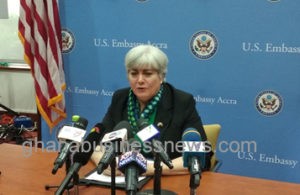New HIV and AIDS strategy launched in Western Region
 Stephanie Sullivan, the United States Ambassador to Ghana has launched the new “HIV and AIDS Joint Strategy” to achieve epidemic control in the Western Region by September 2020.
Stephanie Sullivan, the United States Ambassador to Ghana has launched the new “HIV and AIDS Joint Strategy” to achieve epidemic control in the Western Region by September 2020.
The new strategy brings together, government, civil society organisations, traditional leaders, key populations and health care institutions to focus on guidelines to achieve the UNAIDS 90/90/90 fast track goal, particularly in the Region, which has more than 20,000 female sex workers and a high prevalence of HIV and AIDS.
The 90/90/90 fast track would ensure that 90 per cent of people living with HIV know their status, 90 per cent of the people who know their positive status receive treatment and 90 per cent of the people on treatment have their viral load suppressed.
Viral suppression help people living with the HIV to live healthy, productive lives as well as prevent the spread of the virus to other people.
Ambassador Sullivan, who together with Mrs. Gifty Eugenia Kusi, Deputy Western Regional Minister, launched the partnership for epidemic control said, “we believe the Western Region can achieve the epidemic control and demonstrate Ghana’s leadership role in eliminating the disease”.
She said the US project chose the Western Region because of the spate of industrialization and the influx of female sex workers, adding that, “The United States supports the Government of Ghana to address the epidemic among key populations since the prevalence was high among them”.
“Indeed, HIV prevalence is seven per cent among the key populations, a much higher figure than the general population of 1.7 per cent”.
The Ambassador said the US would continue to implement proven strategies, such as index testing, tap into existing local networks to get people tested, treated and remained on treatment, work with the Ghana Health Service and the Ministry of Health to ensure that drugs reached facilities and train people on electronic register to track patients services.
Though HIV was no more a death sentence, complacency could derail the gains in epidemic control with stigma and discrimination remaining a significant barrier for people to willingly access HIV services.
She celebrated the lives of the “Models of Hope” and “Heart to Heart Ambassadors” for helping to send the message across and being an encouragement and inspiration to people living with HIV.
The US Ambassador called on health facilities to identify new cases, link positive cases to treatment and ensure that they stayed on treatment, saying that, “We have ambitious targets over the next year”.
Mrs. Kusi, was grateful to the US for thinking about the health of the people in the Western Region and pledged the continued support of the Regional Coordinating Council for a successful implementation of all interventions to achieve the 90/90/90 by September 2020 in the Region.
Mr. Badu Sarkodie, Director of Public Health at the Ghana Health Service said there were gaps in achieving real epidemic control, aside issues on early infants diagnosis and differentiated services.
He said the GHS has signed an MoU with all Directors of Health to ensure that the needed attention was given to all public Health activities.
Mrs. Angela Trenton-Mbonde, UNAIDS Country Director anticipated a successful partnership to help achieve the interventions.
Source: GNA
